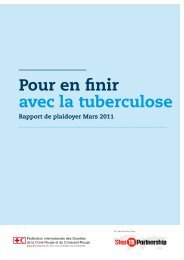Thailand - Stop TB Partnership
Thailand - Stop TB Partnership
Thailand - Stop TB Partnership
You also want an ePaper? Increase the reach of your titles
YUMPU automatically turns print PDFs into web optimized ePapers that Google loves.
meeting organized by Akanni’s organization, Journalists Against AIDS, a group of health<br />
correspondents from major Nigerian media outlets acknowledged that they had limited<br />
knowledge about the seriousness of the <strong>TB</strong> epidemic, how <strong>TB</strong> is spread, the linkage between<br />
<strong>TB</strong> and HIV, and other related issues. 24 “Journalists are not able to write articles about<br />
[<strong>TB</strong>], because we lack information,” a Bangladeshi journalist said. “We don’t receive information<br />
from <strong>TB</strong> experts and programs in a way that we can use it.” 25 Editors and media<br />
owners in Nigeria, Tanzania, and <strong>Thailand</strong> are reportedly reluctant to cover <strong>TB</strong> and other<br />
health topics because they do not believe these “softer” issues will generate enough public<br />
interest. Few government or donor-supported media training programs have focused on<br />
<strong>TB</strong> and <strong>TB</strong>/HIV.<br />
In the absence of a well-articulated NTP communications strategy, few government<br />
<strong>TB</strong> officials have received media training or support in obtaining the necessary skills for<br />
working with the press. Journalists in Nigeria and Tanzania have found that the primary<br />
sources of information on <strong>TB</strong>—public health officials and health care workers—are reluctant<br />
to grant interviews. According to Akanni, to reach Nigerian public health officials,<br />
“there are bureaucracies you have to overcome, and you have to book an interview about<br />
two weeks in advance.” 26 Mwanjisi added that in Tanzania, “When you go to interview [<strong>TB</strong><br />
officials], they’ll tell you a string of expert jargon, and when you ask, ‘Can you please explain<br />
it to me?’ they say, ‘Oh, you would not be able to understand it.’ That kind of attitude puts<br />
off a lot of journalists.” 27<br />
The fact that few civil society organizations are dealing with <strong>TB</strong> further limits<br />
potential sources of information for journalists. Mwanjisi commented that “even HIV support<br />
groups, who are referring people living with HIV to <strong>TB</strong> services, do not know anything<br />
about what is happening with the national <strong>TB</strong> program.” 28<br />
Stigma and discrimination<br />
Stigma is frustrating access to <strong>TB</strong> treatment especially for people living<br />
with HIV . . . [and] the hostile attitude of health care officials . . .is<br />
responsible for this. Nobody would want to go to a place where he or<br />
she is likely going to be treated like an outcast. No matter how effective<br />
the treatment becomes, at the end of the day, you will simply avoid such<br />
places. If that is the only place where such treatment exists, so be it; some<br />
individuals would rather die than go there.<br />
—Yinka Jegede-Ekpe, coordinator, Nigerian Community of Women<br />
Living with HIV 29<br />
18<br />
<strong>TB</strong> POLICY IN THAILAND



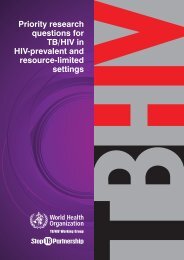

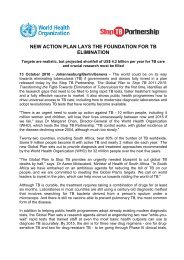

![Global Drug Facility Annual Report 2011 [.pdf] - Stop TB Partnership](https://img.yumpu.com/26788745/1/184x260/global-drug-facility-annual-report-2011-pdf-stop-tb-partnership.jpg?quality=85)

![Concept note on national stop TB partnership [.pdf]](https://img.yumpu.com/26788741/1/184x260/concept-note-on-national-stop-tb-partnership-pdf.jpg?quality=85)

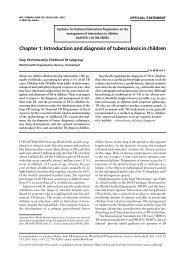
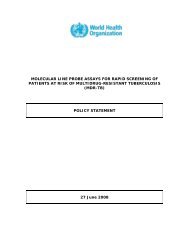
![2005 and Challenges for 2006 - 2015 [.pdf] - Stop TB Partnership](https://img.yumpu.com/26788674/1/190x245/2005-and-challenges-for-2006-2015-pdf-stop-tb-partnership.jpg?quality=85)
![Brochure (French) [.pdf] - Stop TB Partnership](https://img.yumpu.com/17234792/1/190x91/brochure-french-pdf-stop-tb-partnership.jpg?quality=85)

